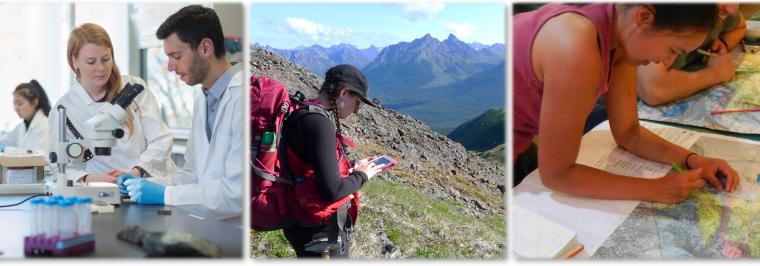
Students pursuing geology, geophysics, oceanography or Earth & Ocean Science specializations in the Department of Earth, Ocean and Atmospheric Sciences can gain relevant co-op work experience in a wide range of Earth science disciplines. Examples of work settings include field, lab, office or research positions in exploration for new deposits of critical minerals like copper, lithium, gold and others; production settings in existing mines, processing plants or mine-site remediation; addressing coastal, mountain or other hazards; water management, hydrology or hydrogeology; marine biology, or physical oceanography; environmental assessment or evaluation for research or engineering projects; computing, programming or mathematical aspects of modeling climate, environmental and other processes; and many more. The multi-disciplinary nature of a degree from the Department of Earth, Ocean and Atmospheric Sciences means there are many options for work that will set you up as a highly desirable individual for future career or academic opportunities. Note there are separate Co-op pages for students studying atmospheric sciences or environmental sciences.
Application Deadlines
| Apply in Year (At Time of Application Deadline) | Application Deadline Date |
|---|---|
| 2 & 3 | Tuesday, September 15, 2026 |
Application requirements
- Have a minimum cumulative average of B- (68%)
- Be a full-time UBC (Vancouver) student in good academic standing in mathematics, English and the sciences
- Having a full-class driver’s license will increase chances of placement by a significant margin as quite a large portion of postings for Earth, Ocean and Atmospheric Science Co-op require students to have a Class 5 driver’s license
- Good communication skills, and a responsible, mature attitude
- Demonstrated leadership, teamwork and time management
- Demonstrated interest in your chosen field
- Be flexible and willing to accept a work placement outside the Lower Mainland
NOTE: Being eligible does not automatically guarantee your acceptance into the Co-op Program.
Work terms schedules
Schedule A
| Year | Fall | Winter | Summer |
|---|---|---|---|
| 1 | Study Term 1 | Study Term 2 | - |
| 2 | Study Term 3 | Study Term 4 | - |
| 3 | Study Term 5 | Work Term 1 | Work Term 2 |
| 4 | Study Term 6 | Study Term 7 | Work Term 3 |
| 5 | WorkTerm 4 | Study Term 8 | - |
The above schedule is highly recommended by the Co-op Program in order for students to complete their program within the shortest time frame. Alternate scheduling is available in consultation with your Co-op Coordinator.
Schedule B
| Year | Fall | Winter | Summer |
|---|---|---|---|
| 1 | Study Term | Study Term | - |
| 2 | Study Term | Study Term | - |
| 3 | Study Term | Study Term | Work Term |
| 4 | Work Term | Work Term | Work Term |
| 5 | Study Term | Study Term | - |
Sample Jobs and Companies
Alberta Energy Regulator
Mining Authorizations Group This group is responsible for ensuring the safe, efficient, orderly and environmentally responsible development of oil sands and coal mining, and upgrader projects. Within this group, the EPEA and Water Act team is responsible for assessing projects to ensure that they comply with the Environmental Protection and Enhancement Act, the Water Act, and AER rules and directives. The Co-op student will work within a diverse team of engineers, geologists and science specialists to review and assess mining developments. Key responsibilities of the Co-op student include: assist in the review of mining applications and authorization requests; assist in the review of annual reports; and communicate with representatives from industry, government, and other stakeholders regarding applications associated with mining development as required.
Success Stories
Patrick Savage
Earth, Ocean and Atmospheric Sciences
8 months @Agriculture & Agri-foods Canada; 8 months @UBC Centre for High-throughput Biology Patrick has had two diverse Co-op experiences: first in a research position (both lab and field) focusing on finding a suitable biological control agent for insect pests. In contrast, Patrick’s most recent Co-op position was as a bioinformatics research assistant as part of a multidisciplinary team, with a focus on neuroscience and the development of tools relating to large-scale and meta-analytical genomics. The diversity of Patrick’s Co-op research experience will be valuable because he intends to pursue graduate school after the completion of his undergrad degree.